Expert survey series: Societal and geopolitical changes in a post-COVID-19 world
In this third installment of data-driven analyses by the Atlantic Council’s GeoTech Center, we analyze how respondents believe COVID-19 and national responses to it will shape economies and societies in the years to come. This survey followed the same format as previous installments: ten voluntary and anonymous questions that each received a 95 percent or higher response rate from 60 respondents.
Key Findings
Experts in geopolitics and technology, given a range of one month to four years, estimated how long a return from the pandemic to normalcy (or something like it) would take. Most expect a full recovery after two years, following predictions about the development of a vaccine, though some are more optimistic, with the shortest anticipated recovery taking only four months (see figure 1).
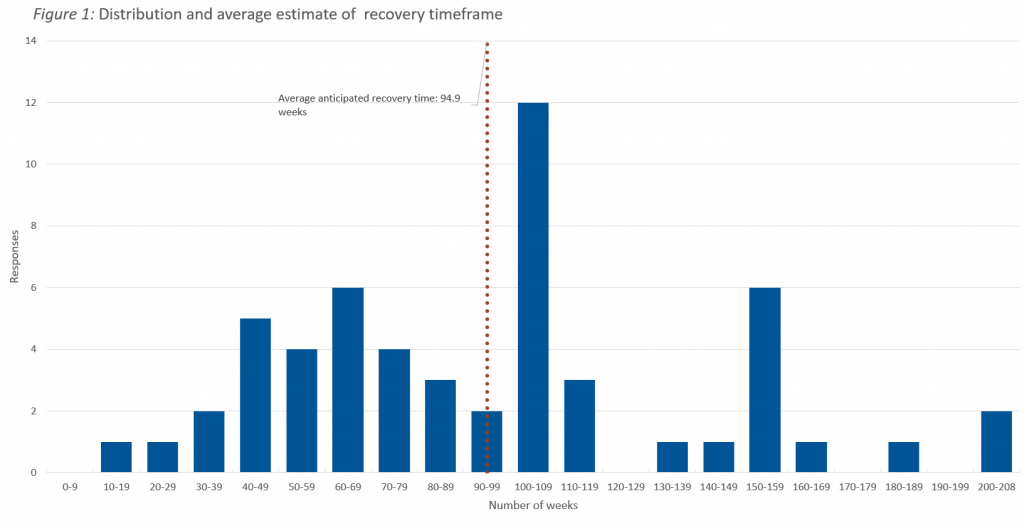
Experts also indicated what obstacles they believe will hinder a swift global recovery. More than 80 percent fear a second wave of infections, and many also worry about geopolitical tensions, internal polarization, and ineffective international organizations (see figure 2). Respondents were encouraged to elaborate on challenges that the survey didn’t list, too, and several stated their concerns about economic inequality, unemployment, dysfunctional leadership, misinformation, excessive concern for public perception, and the general complexity of executing any recovery strategy.
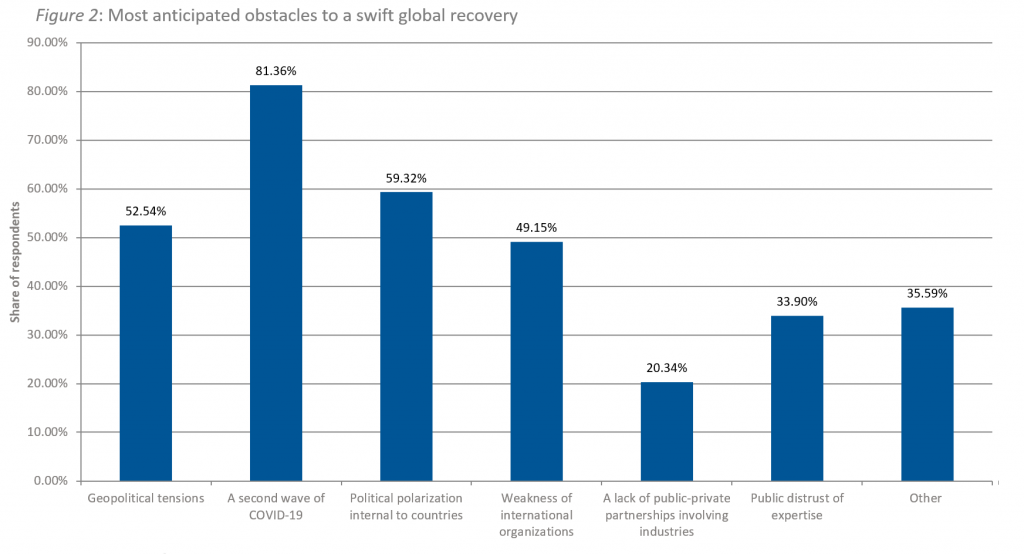
In addition to ranking anticipated obstacles, respondents also listed the region or regions where they expect the swiftest recoveries. More than 70 percent believe China will demonstrate a rapid return to normalcy, and approximately 64 percent hold Singapore, Japan, and South Korea in similar regard. Between 32 and 39 percent predict a swift recovery in Western nations – the United States, the European Union, the United Kingdom, Canada, Australia, and New Zealand. Few respondents have faith in the rest of the world’s ability to recover quickly (see figure 3).
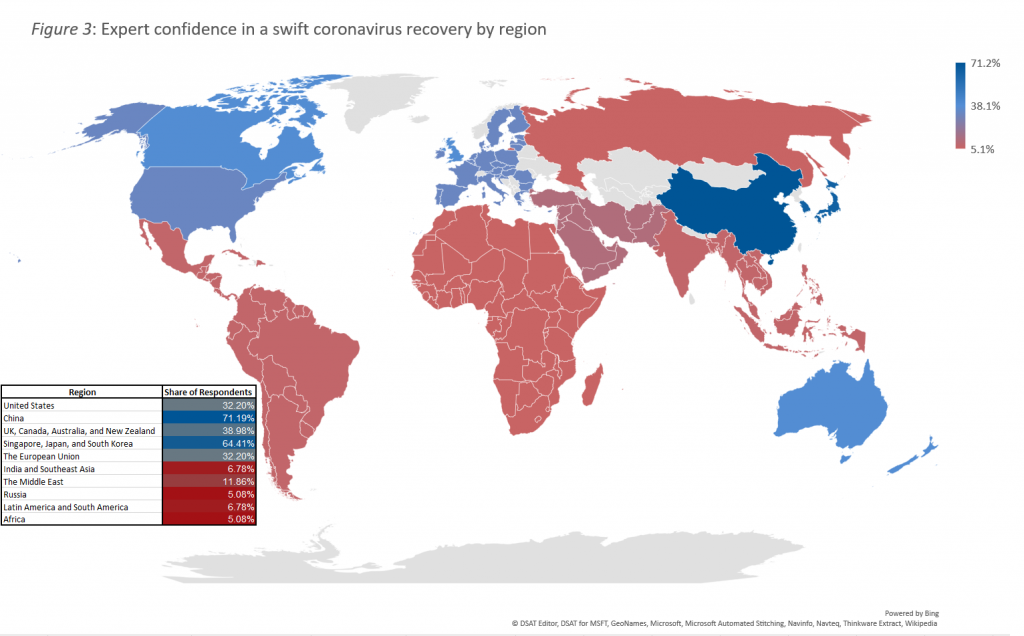
In the pandemic’s wake, most experts believe that, overall, more governments will provide welfare or assistance to their citizens in some form. 76 percent of respondents foresees a moderate or significant increase in the number of countries providing education and retraining, which is most likely connected to anticipated further automation processes. Significant portions of the sample also predict moderate increases in the number of countries providing universal basic income and universal healthcare, though a larger share believes little change will occur in those areas. Opinion on governments’ provision of business subsidies was less conclusive, and more experts indicate that a decrease in the number of countries providing such aid was possible (see figure 4).
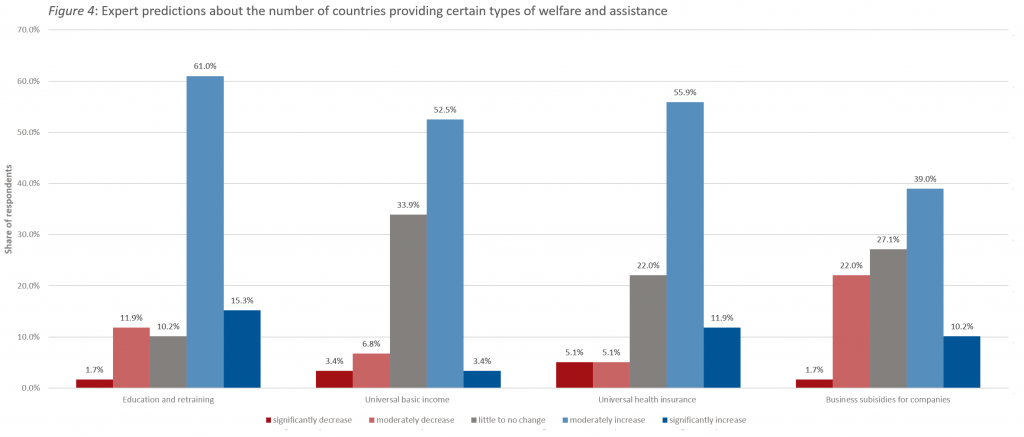
In free markets, respondents believe automation will decrease employment for unskilled laborers, but their opinions of its effect on skilled labor are split almost evenly between increased and decreased employment, while about 10 percent anticipate no effect at all. In state-controlled markets, respondents are more optimistic about the fate of unskilled labor, with almost 40 percent believing automation will have little effect on employment there. Their opinion on skilled labor in state-controlled markets is more optimistic than in free markets: many more anticipate no effect, and slightly more anticipate increased employment (see figure 5).
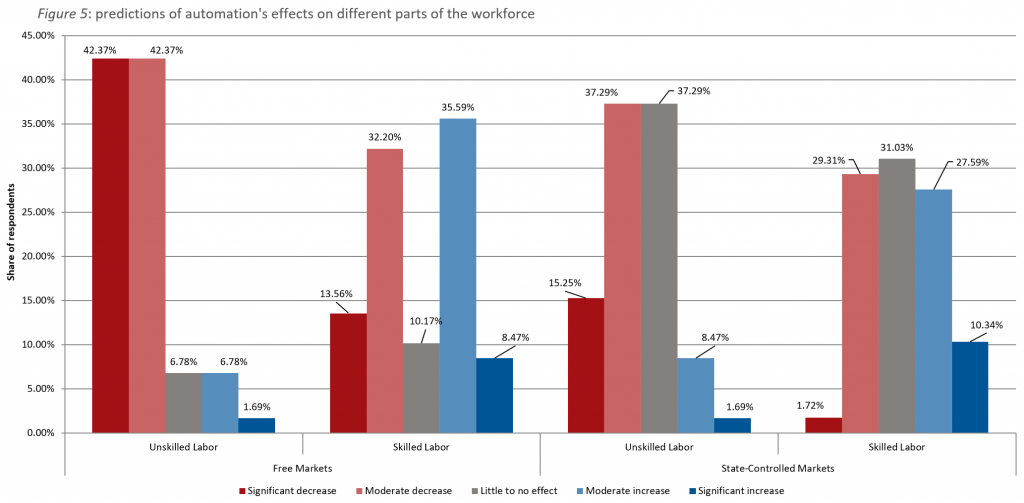
A battery of four questions asked about the pandemic’s impact on polarization and solidarity within countries and cooperation between them. Answers were bimodal. Respondents are evenly split over the pandemic’s effects on internal Chinese solidarity and international cooperation, and while they believe the United States and the European Union would grow more polarized on average, a significant portion maintained that the two would grow less polarized (see figure 6).
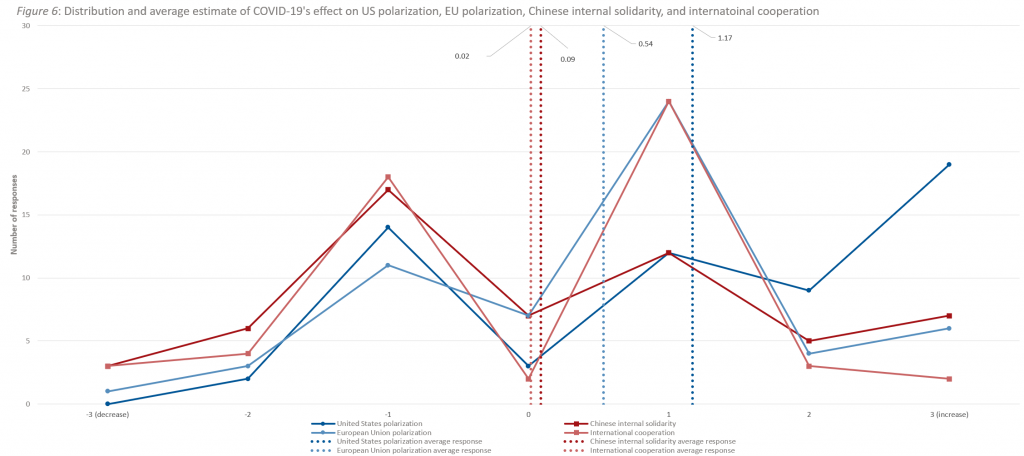
Last, the survey polled respondents for their predictions of how the pandemic and technological innovation would change the global standing of different countries and regions. Notably, while responses were unimodal for almost all geographies, opinions about the United States and China were bimodal (see figure 7 for select distribution comparisons). Experts believe that Singapore, Japan, and South Korea will see their global standing grow the most, while China, the United Kingdom, Canada, and New Zealand might see theirs increase slightly. They also believe that the European Union will see a slight decrease in its standing, that the United States and Russia would see the greatest decline, and that the rest of the world would see moderate decline (see figure 8).
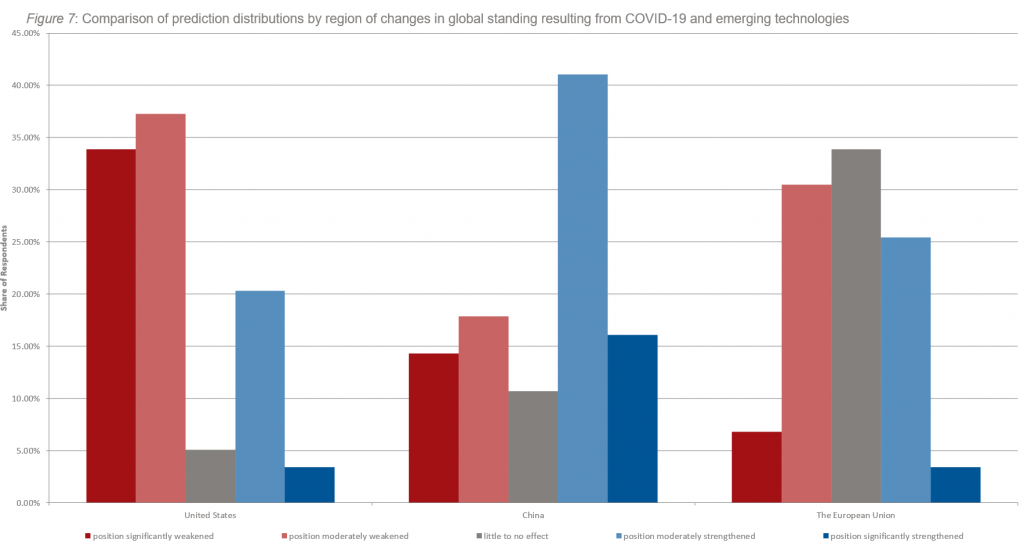
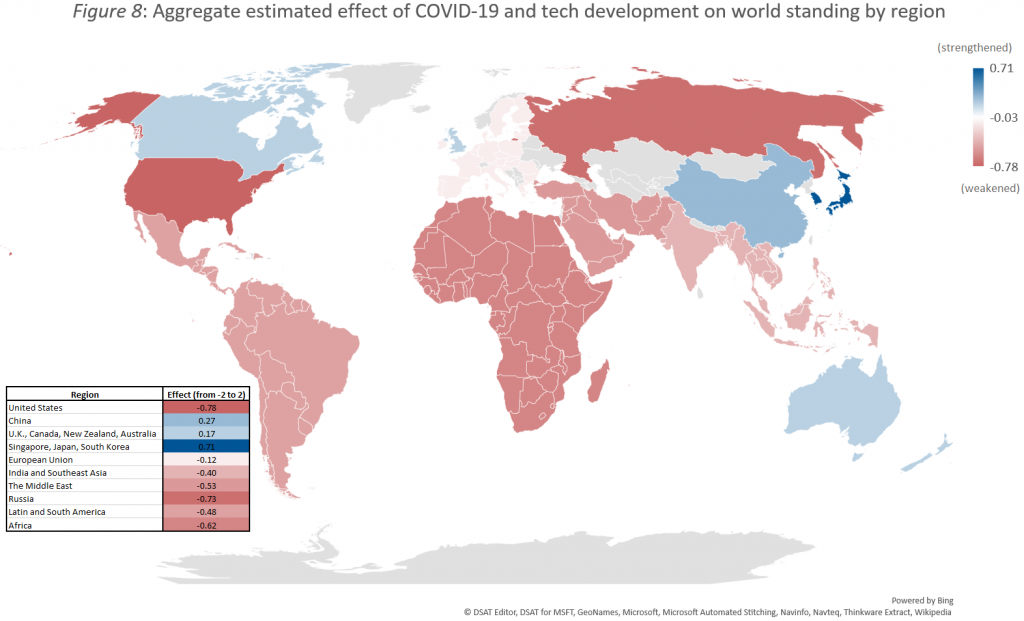
Behind the Data
The survey’s results align with and elaborate on our previous findings. Experts believe the pandemic is exacerbating systemic challenges that have long gone unaddressed: misinformation, economic inequality, deficient and discordant leadership, polarized populaces, and a strained international order. Down one path, they see China and its state-controlled market emerging swiftly from the pandemic with newfound global prominence, an economy resilient to impending technological upheaval, and a united populace, all while the West falters in its recovery, struggles with internal divisions and political challenges, and is ravaged by a churning free market.
Down the other path, the story is flipped. China’s global standing suffers because of its initial reluctance to admit the severity of COVID-19’s threat and its lack of transparency about its domestic response. Reshuffled global supply chains and declining trust pile onto the state-controlled economy, frustrating its ability to capitalize on innovation. Meanwhile, the West begins addressing its internal strife, taming the turbulence of massive technological change, and reversing what appears today as a slow, painful decline. None believe any of this will turn out well for the world beyond China, the West, and a handful of its key allies.
Interestingly, the surveyed experts favor the first path: after all, many political divisions in the West have widened during the pandemic, especially in the United States, and, with the exceptions of Australia and New Zealand, Western nations at least appear to be faring worse in their response to the virus. Figure 9 details the relationships between the respondents’ predictions about polarization, solidarity, and cooperation by plotting the number of response pairings for each combination of the four fields. Overall, those who predict greater polarization in the West also predict greater unity in China, and those who foresee more discord in China likewise anticipate more unity in the West. There is no consistent trend associated with beliefs about the future of international cooperation, and an outlier group believes the European Union would grow more polarized as China grows less unified. However, the relationships between answers also reveal the possibility of a third trajectory for the future.
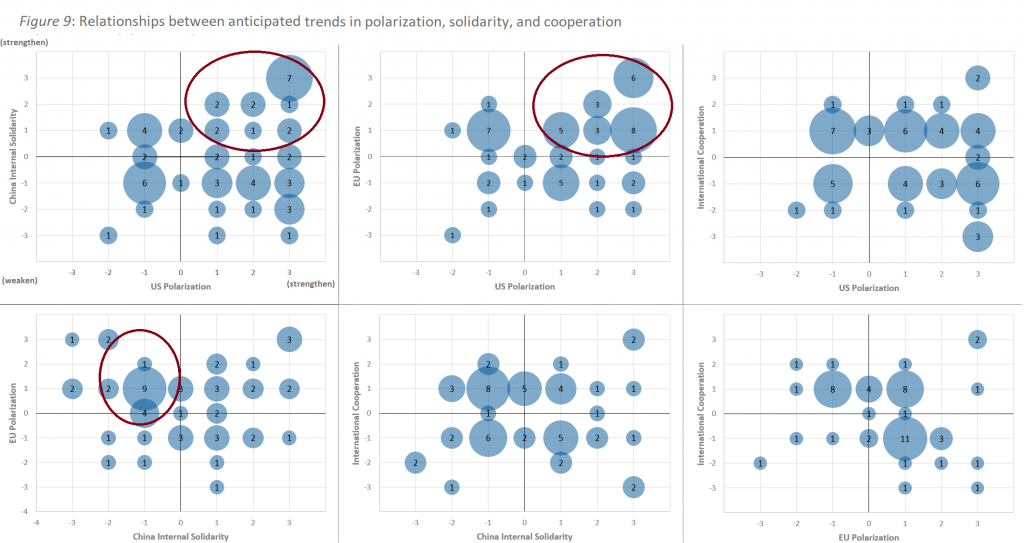
Simply put, answers didn’t cluster particularly tightly. There are overlaps, disagreements, and exceptions. The clearest instance of belief in a world more complicated than one split between China and the West came in response to our question about changes in world standing. By far the most positive anticipated change was associated with Singapore, Japan, and South Korea. These nations, for now, seem to have married democratic governance and free market economies with successful top-down reactions to COVID-19. The lesson to be drawn from these nations is not that they are the best models for a pandemic response – that remains to be seen – but that, even as the world appears to realign around a new great power struggle, policymakers should not follow suit by limiting their solutions to a bipolar world order, and that the comparative weaknesses of open societies can be compensated for and, maybe, overcome.
Previous expert survey series post:

The GeoTech Center champions positive paths forward that societies can pursue to ensure new technologies and data empower people, prosperity, and peace.
